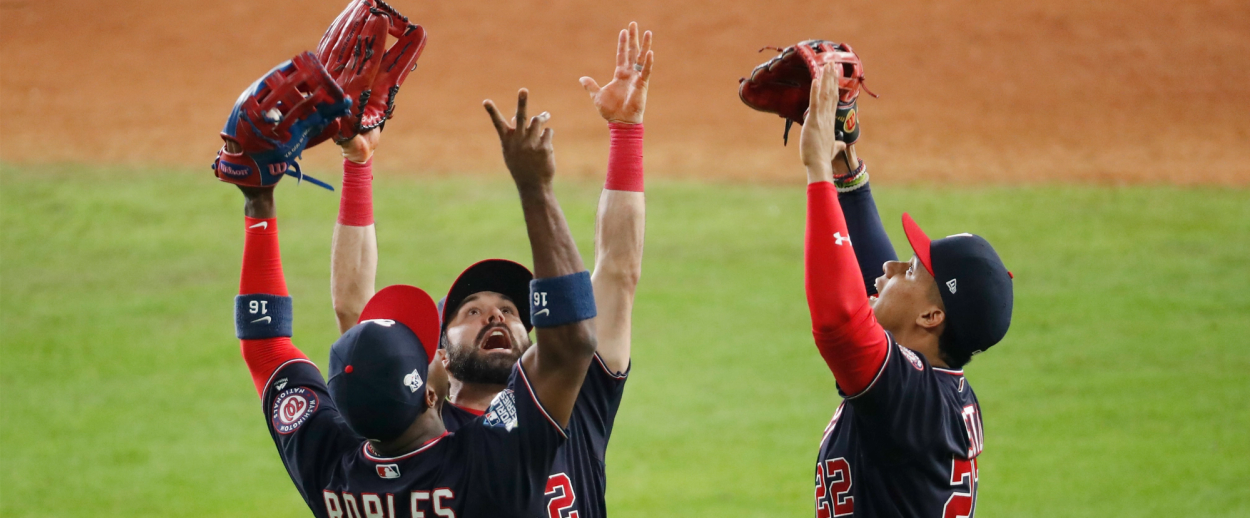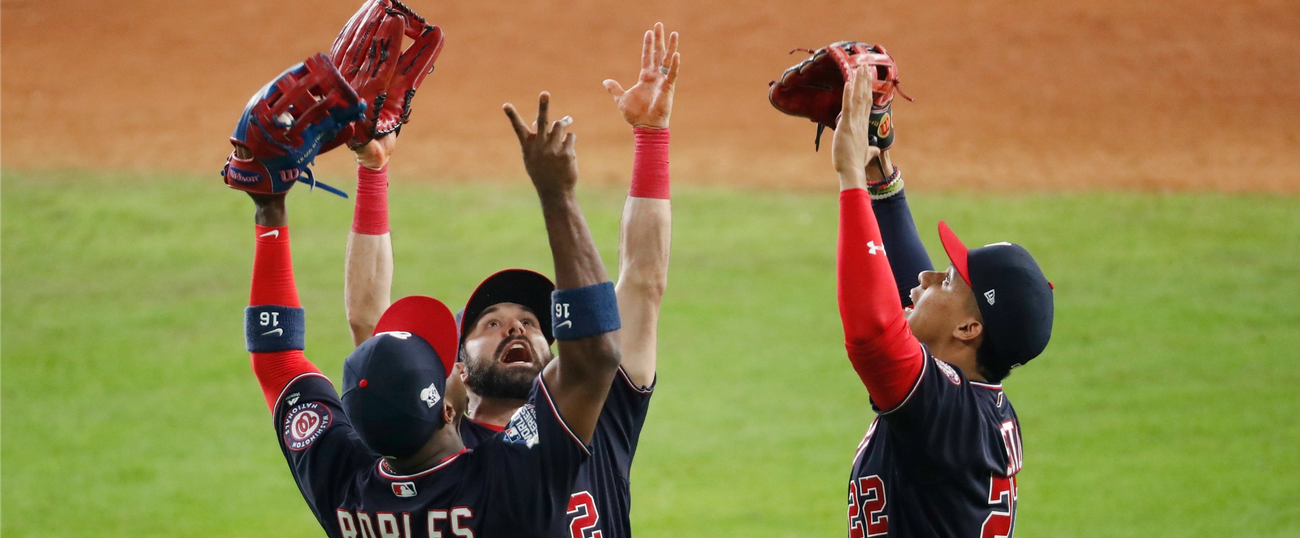The Washington Nationals’ World Series victory on Wednesday night was a revelation, in the sense that Daniel Hudson’s final slider to the Astros’ Michael Brantley laid bare the true ordering of reality, unveiling a cosmic architecture we Nats fans had never been allowed to glimpse before.
The list of our misfortunes is long and illustrious—to us, at least. From the Esmilyan Gonzales fiasco to the Jim Riggleman mess; from a playoff collapse against the Cardinals to an arguably even worse playoff collapse against the Cubs; from the dumb camel that manager Dave Martinez brought to Spring Training before a failed 2018 campaign—an exhortation to get “over the hump,” see?—to star player and all-around frustrating enigma Bryce Harper bolting town for the disgusting Philadelphia Phillies over the subsequent offseason, presaging a 19-31 start to what looked like another wasted year for us—the Nats fan tended to view baseball as coextensive with the drudgery of normal life, with all of its missed opportunities and frustrated hopes. Then Brantley’s bat sliced the empty air, Hudson hurled his glove in elation, and it all changed. Or really nothing changed: We got to see what had always been there and to live out the happy ending that our story was always heading towards.
So why did it happen this year? If I had to proffer a rational explanation, the difference between this squad and the Nats of the past is that the starting pitching went deep into key postseason games. These Nats had the worst bullpen ERA of any team ever to make the playoffs and it barely ended up mattering, thanks largely but not entirely to World Series MVP Steven Strasburg and co-ace Max Scherzer. Offensive inconsistency becomes a bad memory if your bats all show up three or four games per series; timely outbursts from hitting prodigy Juan Soto, National League MVP candidate Anthony Rendon, and aging slugger Howie Kendrick plugged those Harper or Denard Span-sized craters in the lineup that pock-marked postseasons past.
The rational explanation doesn’t fully work, though. Washington Post columnist Thomas Boswell did a back-of-the-envelope calculation using the lowest possible win probabilities during the Nats’ five elimination games in which the team trailed—a record for a single postseason—and determined that their odds of winning the World Series were around .0003%. Speaking of things that lie beyond mere rationality, while this year’s championship wasn’t always memorable for its on-field play, between the seven straight victories for the road team—by far a record for any playoff series in any sport—the booing of the president, the game 6 interference controversy, followed by a righteously pissed-off tantrum for the ages from Martinez; Nats ace Max Scherzer’s Bonitis outbreak before game 5 and miraculous recovery from said outbreak in time for game 7; and the death of ISIS leader Abu Bakr al-Baghdadi in the middle of game 4, this was one of the most exhilaratingly weird World Series ever played.
Perhaps the camel had something to do with it, and the magic stored in the hump of that mystical Ship of the Desert works on a one-year delay. Or maybe this was the mighty hand of Hashem. It certainly can’t be ruled out that the Nats World Series is proof that the God of the Israelites really does care about us and want us to be happy. After all, there is something undeniably Jewish about rooting for a perennially disappointing team without fully buying into the idea that their day will come or that you’ll get to see it when it does. Many of the tradition’s greatest hits are about the Jews’ struggle to accept that the good times really are coming, and their skepticism is usually warranted. Why should the Israelite slaves have started packing their bags and why on, say, year 37 of wandering the desert, should they have believed any promised land was waiting for them? The prophets’ prediction of the fall of Assyria or Babylon must have seemed worse than absurd and read as slightly delusional even with the benefit of hindsight. But guess what–the prophets were right. In Judaism, the bad things, and even the very worst things, take their meaning from a future redemption that no human being will be able to stop.
Baseball is trivial in comparison to whatever Isaiah or Ezekiel were talking about and the stakes of even a very important sporting event are comfortingly low, in the larger sense. Except that baseball isn’t trivial, and the stakes are not low, and in any case some of the sacred fragments forming the vessels of light that broke at the moment of creation are bigger than others, even though all of them eventually need to be found. Maybe some fragments look bigger the closer you are to finding them: Sports fandom is an investment of time and self at their most personal and intimate. Games and seasons and eras become life-long psychic beacons; their ecstasies and disappointments beam backwards and forwards. Here’s one example. I watched game 7 at a raucous Nationals Park, where some 16,000 fans gazed towards the stadium jumbotron in a cold rain. After the game, still coasting on jetstreams of pure uncomplicated joy, I was sure to walk my friends past the spot in dead center field where I watched the Nats blow a six-run lead to the St Louis Cardinals in game 5 of the National League Divisional Series on October 12th, 2012, my worst day as a sports fan (aside from the murder of Sean Taylor, that is). I remember it was like the air itself had a different composition after that final out–thousands of other demoralized fans were crowding around me but also at some terrifyingly vast remove , like we were all walking through the blank loneliness of deep space, making our way not to the Navy Yard Metro station but to some distant and unseen oblivion. It was that bad. And after Wednesday night, it was completely worth it.

